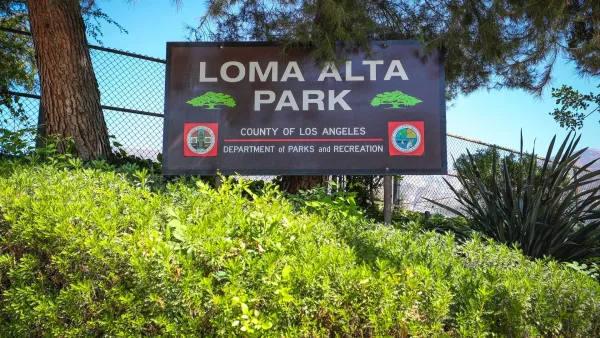"Not knowing which kinds of buildings consume what is like not being able to gauge differences between a diesel truck and a hybrid car."
Laura Bliss reports on a new tool produced by Stephanie Pincetl, a UCLA environmental planning scholar, and her colleagues at the California Center for Sustainable Communities to measure the energy use of buildings around Los Angeles County.
The Energy Atlas, as it's known, provides a database that "charts and maps previously unreleased data on household natural gas and electricity consumption obtained from utilities alongside Census records." Bliss also adds that the Energy Atlas is "fully searchable: The curious can sort L.A.’s energy use by income, neighborhood, energy type, building age, and plenty of other measures."
Bliss then puts the Energy Atlas to good use, exploring its database for a few conclusions about energy use in Los Angeles. So, for instance, Bliss uncovers this probably-not-at-all surprising revelation: "Given that low-income families tend to live in multi-family buildings, perhaps it’s not surprising that the highest energy users were also those with the highest incomes. Residents of wealthy beachside Malibu used more than 10 times more energy per capita than those in working-class Bell, a city south of east L.A."
FULL STORY: L.A.'s New 'Energy Atlas' Maps Who Sucks the Most Off the Grid

Planetizen Federal Action Tracker
A weekly monitor of how Trump’s orders and actions are impacting planners and planning in America.

San Francisco's School District Spent $105M To Build Affordable Housing for Teachers — And That's Just the Beginning
SFUSD joins a growing list of school districts using their land holdings to address housing affordability challenges faced by their own employees.

The Tiny, Adorable $7,000 Car Turning Japan Onto EVs
The single seat Mibot charges from a regular plug as quickly as an iPad, and is about half the price of an average EV.

Trump Approves Futuristic Automated Texas-Mexico Cargo Corridor
The project could remove tens of thousands of commercial trucks from roadways.

Austin's First Single Stair Apartment Building is Officially Underway
Eliminating the requirement for two staircases in multi-story residential buildings lets developers use smaller lots and more flexible designs to create denser housing.

Atlanta Bus System Redesign Will Nearly Triple Access
MARTA's Next Gen Bus Network will retool over 100 bus routes, expand frequent service.
Urban Design for Planners 1: Software Tools
This six-course series explores essential urban design concepts using open source software and equips planners with the tools they need to participate fully in the urban design process.
Planning for Universal Design
Learn the tools for implementing Universal Design in planning regulations.
Smith Gee Studio
City of Charlotte
City of Camden Redevelopment Agency
City of Astoria
Transportation Research & Education Center (TREC) at Portland State University
US High Speed Rail Association
City of Camden Redevelopment Agency
Municipality of Princeton (NJ)





























